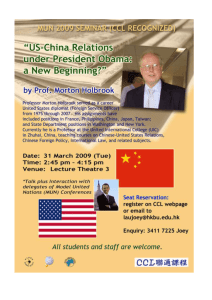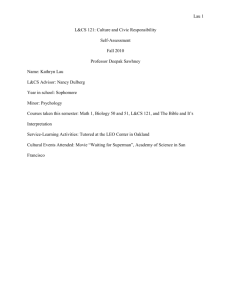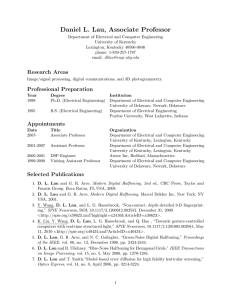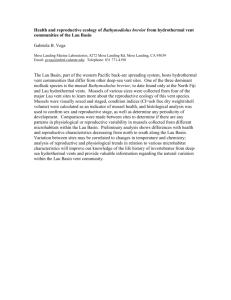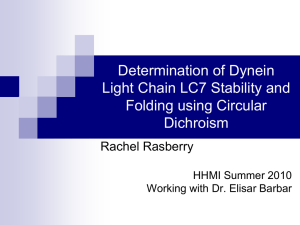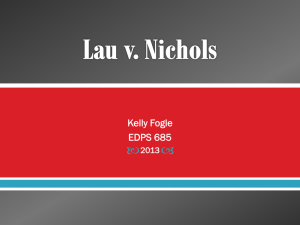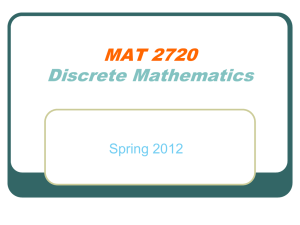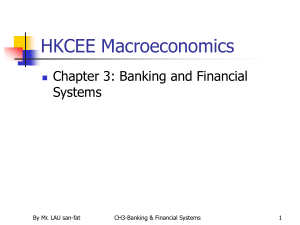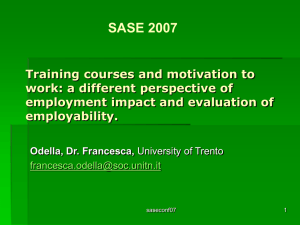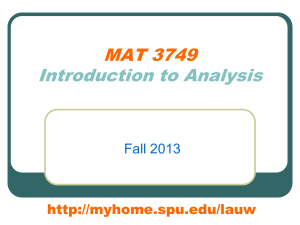To a previous generation of students at the School of Oriental and
advertisement
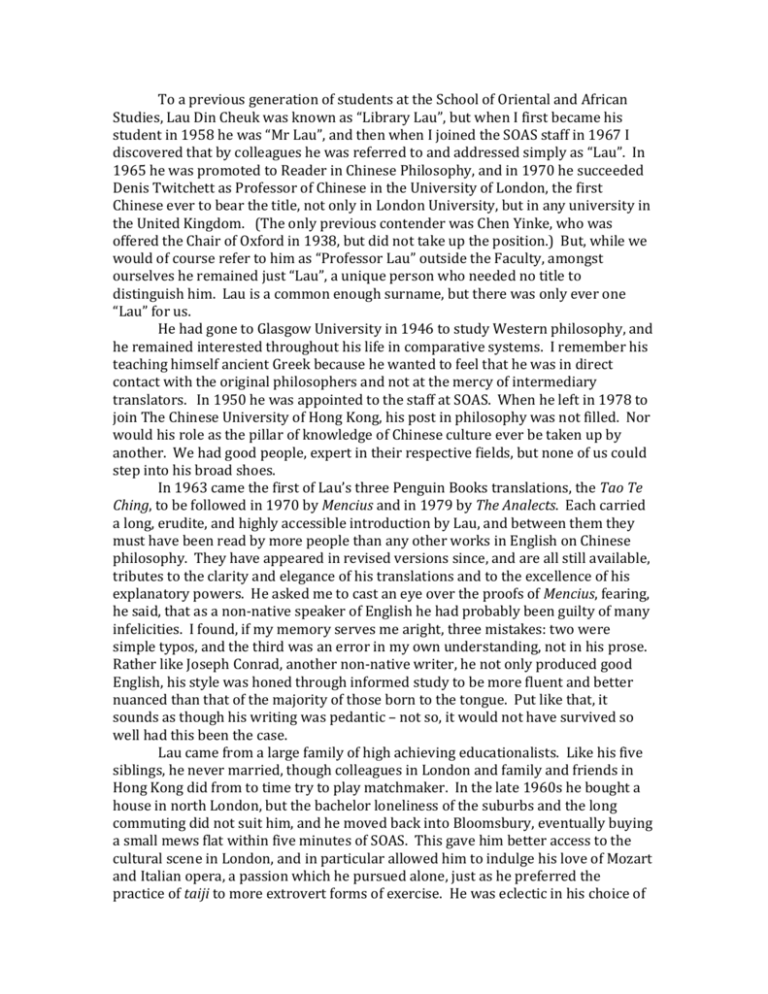
To a previous generation of students at the School of Oriental and African Studies, Lau Din Cheuk was known as “Library Lau”, but when I first became his student in 1958 he was “Mr Lau”, and then when I joined the SOAS staff in 1967 I discovered that by colleagues he was referred to and addressed simply as “Lau”. In 1965 he was promoted to Reader in Chinese Philosophy, and in 1970 he succeeded Denis Twitchett as Professor of Chinese in the University of London, the first Chinese ever to bear the title, not only in London University, but in any university in the United Kingdom. (The only previous contender was Chen Yinke, who was offered the Chair of Oxford in 1938, but did not take up the position.) But, while we would of course refer to him as “Professor Lau” outside the Faculty, amongst ourselves he remained just “Lau”, a unique person who needed no title to distinguish him. Lau is a common enough surname, but there was only ever one “Lau” for us. He had gone to Glasgow University in 1946 to study Western philosophy, and he remained interested throughout his life in comparative systems. I remember his teaching himself ancient Greek because he wanted to feel that he was in direct contact with the original philosophers and not at the mercy of intermediary translators. In 1950 he was appointed to the staff at SOAS. When he left in 1978 to join The Chinese University of Hong Kong, his post in philosophy was not filled. Nor would his role as the pillar of knowledge of Chinese culture ever be taken up by another. We had good people, expert in their respective fields, but none of us could step into his broad shoes. In 1963 came the first of Lau’s three Penguin Books translations, the Tao Te Ching, to be followed in 1970 by Mencius and in 1979 by The Analects. Each carried a long, erudite, and highly accessible introduction by Lau, and between them they must have been read by more people than any other works in English on Chinese philosophy. They have appeared in revised versions since, and are all still available, tributes to the clarity and elegance of his translations and to the excellence of his explanatory powers. He asked me to cast an eye over the proofs of Mencius, fearing, he said, that as a non-native speaker of English he had probably been guilty of many infelicities. I found, if my memory serves me aright, three mistakes: two were simple typos, and the third was an error in my own understanding, not in his prose. Rather like Joseph Conrad, another non-native writer, he not only produced good English, his style was honed through informed study to be more fluent and better nuanced than that of the majority of those born to the tongue. Put like that, it sounds as though his writing was pedantic – not so, it would not have survived so well had this been the case. Lau came from a large family of high achieving educationalists. Like his five siblings, he never married, though colleagues in London and family and friends in Hong Kong did from to time try to play matchmaker. In the late 1960s he bought a house in north London, but the bachelor loneliness of the suburbs and the long commuting did not suit him, and he moved back into Bloomsbury, eventually buying a small mews flat within five minutes of SOAS. This gave him better access to the cultural scene in London, and in particular allowed him to indulge his love of Mozart and Italian opera, a passion which he pursued alone, just as he preferred the practice of taiji to more extrovert forms of exercise. He was eclectic in his choice of taiji styles, and a colleague told me that he once saw Lau travel standing in a bus all the way across Taipei without once touching the handrail or falling over, so well developed was his sense of balance. From his new base he gradually broke through his somewhat solitary habits, happily giving taiji demonstrations to anyone interested, inviting colleagues or senior students back to his flat, where some would cook for him, or walking with them down to Soho’s Chinatown for a leisurely meal. He always took the same route, chosen for the safety of its road crossings rather than its directness. He took to appearing in the SOAS bar in the evenings, not to drink a lot – indeed, he was famous throughout the School for his ability to make a half pint of beer last a whole evening, claiming that he was physically incapable of drinking more than that – but to enjoy the company of colleagues and students, and to find a dining companion. Somewhat austere in his lifestyle and a little intimidating in the seriousness with which he approached academic performance, it was with wonder and delight that students found him so approachable outside the classroom. He was always invited to student parties and unfailingly attended, and he was welcomed as an entertaining and convivial conversationalist with a quick wit and a dry sense of humour. But while he made his mark and was much respected in London, he seemed to grow less happy with it rather than more relaxed and contented. Departmental administrative responsibilities which came with the post of Professor of Chinese were not to his liking (though he shouldered them with more than adequate competence), and he did not relish the boredom and petty bickerings of committee life. Larger student numbers, an increasingly student-driven rather than subjectoriented curriculum, and a trend away from classical studies towards contemporary language and the social sciences, all contributed to his disenchantment. He described his life in London at the time as “making up numbers”, which his student Dr Nigel Bedford to whom this was confided understood to be a feeling of not really belonging and perhaps of not being fully appreciated. Lau seems not to have hesitated when the opportunity to join the Chinese University came up in 1978. Here he found real appreciation, renewed energy, and a productive and fulfilling late career. He never again set foot in the UK. CUHK’s gain was unquestionably SOAS’s loss, and it was keenly felt by his old colleagues. But if Lau had become unhappy or unfulfilled it certainly did not show in any negative way, and he never changed in his attitudes to those he worked with and taught. I was not the only student who benefited from his guidance to the first rung of a career ladder, and he is remembered by all as polite, kindly, unfailingly reliable, a scholar to the core, and always generous with measured advice when asked. We were privileged to have enjoyed the services and friendship of such a man. (Hugh Baker, 2010)
